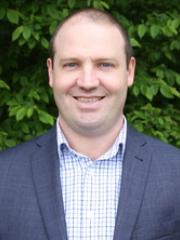Dr Tim McLaren

Researcher biography
Dr McLaren graduated in 2009 with a Bachelor of Rural Science (Honours) from the University of New England, Armidale (NSW), Australia. He then completed a doctorate in soil science and cropping systems in 2013 (main supervisor, A/Prof. Chris Guppy) at the University of New England, followed by a three year postdoctoral research fellowship in soil science and grazing systems (main supervisor, A/Prof. Ron Smernik) at the University of Adelaide. From 2015 to 2021, Dr McLaren was a Senior Scientist and Lecturer in the Group of Plant Nutrition under Prof. Emmanuel Frossard, at the Swiss Federal Institute of Technology (ETH) Zurich, Switzerland. In 2021, Dr McLaren returned to Australia and was appointed as a Senior Lecturer in Soil Science at the University of Queensland.
The overall goal of Dr McLaren's work is to provide new insight on the biogeochemistry of nutrients that will lead to improved outcomes for agricultural and environmental contexts. In particular, he is interested in identifying the diversity of inorganic and organic forms of nutrients, and understanding the processes governing their flux in soil-plant systems. An important part of Dr McLaren's work has been the characterisation of organic matter, and understanding the processes governing the accumulation and depletion of nutrients within soil organic matter. In addition, Dr McLaren has gained much experience on understanding the fate of fertiliser in agroecosystems, and assessing different agronomic strategies to improve plant growth and fertiliser use efficiency, and decrease nutrient transfer to aquatic/marine ecosystems.
Dr McLaren's work has primarily focused on phosphorus, but also included sulfur, nitrogen, and carbon. It has involved a wide variety of analytical approaches, including radiotracers (P-33, S-35), stable isotopes (N-15), spectroscopy (NMR, PXRF, XANES), chromatography (size-exclusion), and 'wet' chemistry (e.g. sequential chemical fractionation and hypobromite oxidation). Research has involved laboratory, glasshouse, and field based experiments, a diversity of soil types, and various ecosystem contexts (e.g. cropping, pasture, and forests). Lastly, Dr McLaren has often worked in colloboration with a variety of stakeholders (e.g. primary producers, agronomists, and industry), and formed international colloborations with applied and fundamental scientists.
